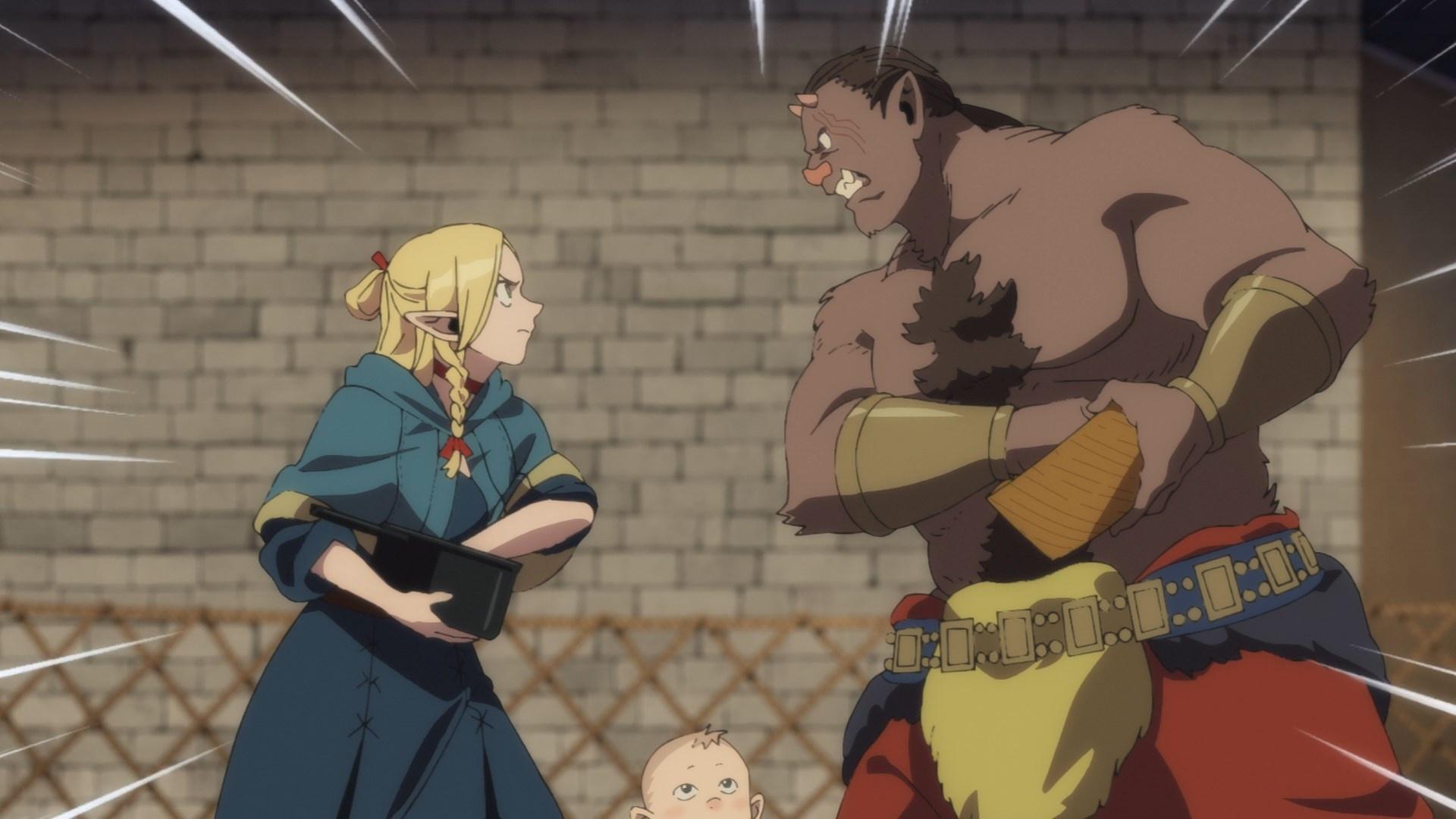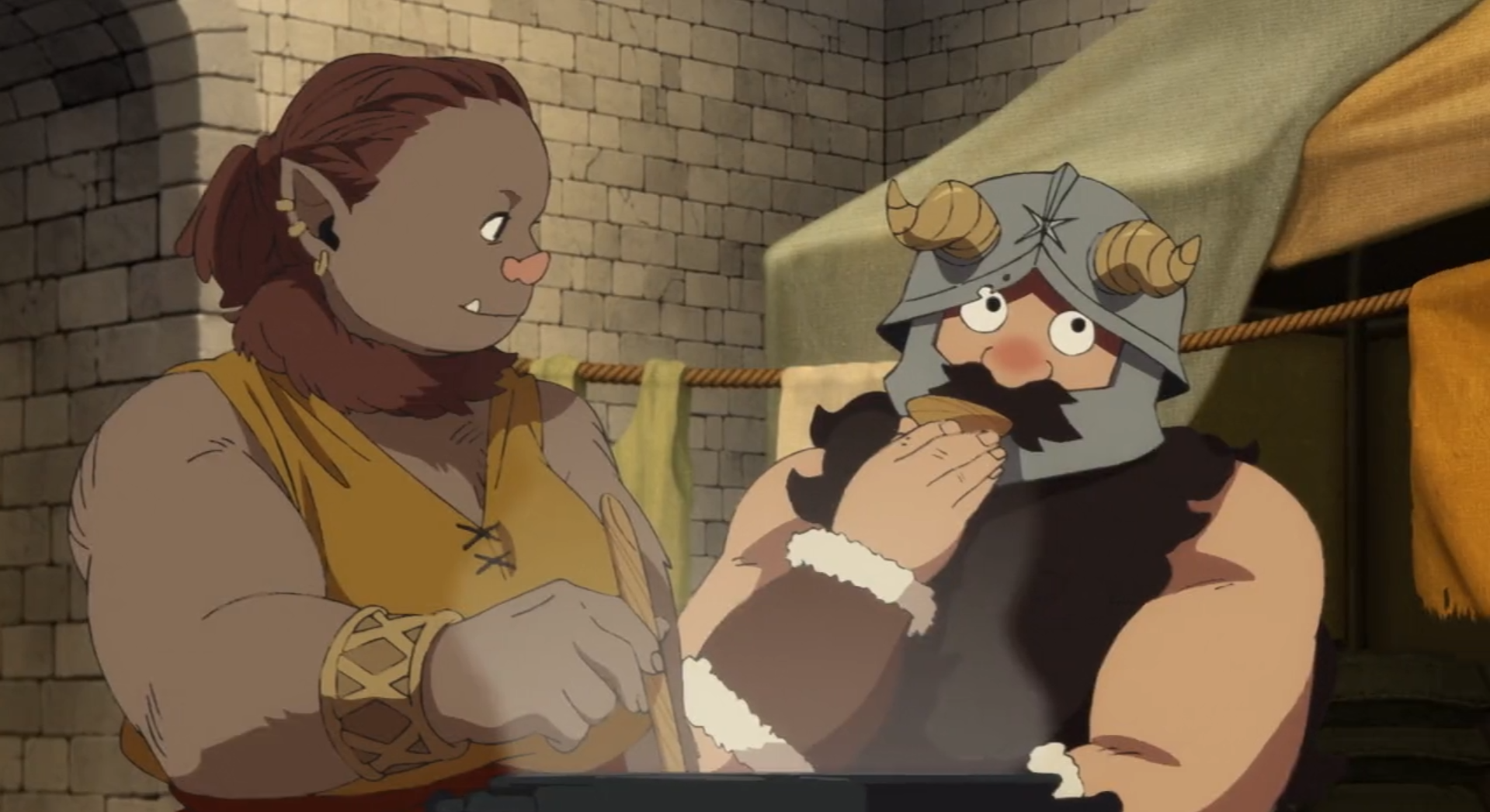Delicious in Dungeon: Oppression, War, and the Power of Bread ★

(Posted June 10, 2024)
[Minor Spoilers for Delicious in Dungeon]
[Content Warning: Contains discussions on war, bombings, starvation, and war crimes.]
I started watching Delicious in Dungeon properly today simply expecting some excellent entertainment while loom knitting. I ended up getting a fantastic reminder about how a single episode of anime can be what sparks education and discussion about history, current events, and the struggles of oppressed people. It was specifically episode four, "Stewed Cabbage/Orcs," that caught my eye. Specifically, it was the dish not mentioned in the title that was of the most importance: Bread.
The entirety of human history was changed when the domestication of wheat over 10,000 years ago shifted lifestyles of those who lived on arable land to become sedentary and agrarian over the traditional nomadic pastoralism that had dominated previously.¹ Bread is used as a symbol of life in major religions, from hearing "Give us this day our daily bread" in every Our Father (Mathew 6:11) to the importance of matzo and challah in Jewish traditions. In Egyptian Arabic, the word for bread is aish which literally translates to life. To put it simply, bread holds power over our entire human consciousness and it is impossible to overstate its importance when used symbolically in a piece of media.
This makes Senshi deciding to bake bread for the orcs in episode 4 even more meaningful. According to Zon, the orc chief, humans and elves have historically oppressed orc kind, violently displacing them from their lands when they lived on the surface. When the dungeon was discovered, orcs moved there to try and make homes, only to be attacked and displaced again as humans decided to start fighting their way through the dungeon as well. We learn all of this through an angry fight between Zon and Marcille, an orc and an elf.

Orcs have often represented marginalized peoples in fiction and there have been many discussions on how anti-blackness is extremely present in medieval fantasy, especially in Tolkien's depictions of orcs. Elves have often been used as allegories for eugenicists with their focus on pure blood and half elves finding difficulties being accepted by any society. We'd need an entirely separate article to dig into the Drow and how they are tangled up in this entire mess too. I find it impossible to believe choosing an elf and an orc to have this argument was not a purposeful artistic point with this in mind.
Current events should compel us to look beyond what is already a fascinating episode to study due to this dynamic alone and see how the events depicted on screen tie into historical oppression and the active starvation of the Palestinian people. Bread holds significance to Palestinians just as it does to most peoples. Taboon bread is the main component of musakhan, which is considered by many to be Palestine's national dish with a particular preparation of it in the country being recognized by the Guinness Book of World Records. Communal taboon ovens are considered important social gathering places in Palestinian villages as well. Now, an occupying force which has forced Palestinians off their lands through the Nakba and continued displacement, violence, and oppression, is specifically targeting bakeries to starve Palestinians and force them off their lands once more. Are the parallels clear to what is happening in Delicious in Dungeon yet?
The targeting of bakeries has traditionally been a highly effective tactic historically in wars — and is currently highly successful in Sudan as well to devastating effect — which makes it hard to think these events aren't being done deliberately as well. There are reasons you can find memorials for destroyed bakeries from World War II and why local reporting at the time often focused on bakeries being destroyed. In Britain, bakers were some of the only groups generally exempt from conscription in WWII. Bakeries were important community centers during the war then as well, not only in terms of providing morale but even allowing those who had their homes destroyed to cook food for their families in their ovens after the bread was finished baking for the day.
This didn't just start in WWII either, the first World War saw massive actions and propaganda made about the patriotic nature of wheat conservation to help win the war. Win the War Cookbook was published in 1918 to help with these efforts and many participated in "Wheatless Wednesdays" to support their troops fighting overseas.
The deprival of bread is the deprival of life. There is a reason fry bread is symbolic to Native Americans of their resilience in the face of displacement and oppression by colonizers. There is a reason this current militaristic group of colonizers now deny bread at any opportunity to Palestinians so they can lack the fuel they need to remain resilient themselves. Even while bread is being denied to those people, the preservation of Palestinian baking traditions have become symbolic of the fight to free Palestine as well with videos circulating on TikTok containing recipes and information on the oppression these people face.

Senshi sees a group of people, displaced and hungry, and the only thing on this glorious man's mind is that he wants to bake bread, something simple, hearty, and filling. The breaking of bread allows for a moment of peace between everyone present. Even Marcille, who had been arguing with Zon before, softens and says orcs are good at cooking, not just stealing. Zon agrees to share the location of where they last saw the red dragon the party is seeking out.
One of the best parts of this episode is a moment where Laios, having learned about the oppression faced by orcs, has to consider his own part in things. What he would do if he cleared the dungeon, became its king, and ruled over it. It's something he hadn't even considered seriously before, but now it is implied he would want to give the orcs control over their own land within the dungeon if he ever succeeds. Laios sees oppression and has decided if given the power to bring an end to it, that he will.
It makes me think of that quote from Pyotr Kropotkin in The Conquest of Bread, "Wellbeing for all is not a dream." Notice that bread motif again? Laios and the party in general is learning so much from Seshi, a man who thanklessly does work on the third floor of the dungeon to help the entire ecosystem, for both people and monsters, who live on each floor. They are learning the role that nourishment, both physical and emotional, has in bettering the world around them. This episode shows how powerful a loaf of bread can be and how much can be learned from breaking it with a group of people who seem different than us. Let us learn some of the same lessons Senshi has taught this party of heroes and apply them to our own lives. The wellbeing of Palestinians and all oppressed peoples, from those in Congo to indigenous populations across the globe, does not have to be a dream.
As Maya Angelou so perfectly put it, "no one of us can be free until everybody is free." Let us do all we can to ensure the freedom of all and recognize the power bread has in making that a reality.
![]()
1. Eckardt, N. A. (2010). Evolution of domesticated bread wheat. the Plant Cell, 22(4), 993. https://doi.org/10.1105/tpc.110.220410
![]()
